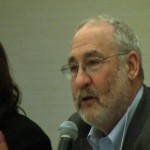Economist Joseph Stiglitz spoke at the National Conference for Media Reform this past weekend, focusing in on some of the many of the conflicts that are inherent to news media. I videotaped his presentation (see below).
The most obvious conflict is between wrongdoers (e.g., banks) who are actively hiding their wrongdoing from news reporters. For example, the Federal Reserve had been hiding the fact that it used U.S. tax dollars to bail out foreign banks, a fact that was recently revealed. But there are many other types of conflicts. For example, accurate information is a public good. Unfortunately, there is not a strong incentive for producing accurate and essential information, “because everyone benefits from this.” Exacerbating this problem is the fact that there are strong private incentives for distorting information (e.g., financial institutions are often guilty of this). The upshot is that we hear ridiculous claims by those positioned to benefit from that false information (e.g., that the economic stimulus was necessary and effective).
Here’s another conflict: Much of the “news” is a byproduct of advertising. This creates a conflict of interest because the “new” provider will try inevitably attempt to be sensitive to the economic needs of the advertisers. This bias is far more dangerous when it shows up in newspapers than when private parties issue their own press releases, where we all expect such

information to be biased.
Another problem is that those who want information to be promulgated will be inclined to spin the information as necessary in return for the willingness of a news provider to provide coverage. When I heard Stiglitz state this, I thought of the tendency of news providers to enhance the conflict of their stories in order to make them more “newsworthy.”
Here’s another conflict: Some reporters are owned by certain politicians. If they fail to provide coverage that satisfies the politician, they will get cut off from future information.
Here’s yet another conflict. Everyone wants to be a cheerleader. Reporters tend to report good news. They want to hear that everything is OK, and that the stock market is going up up up. Hence, that is too often the way the news is spun, regardless of the facts on the ground.

